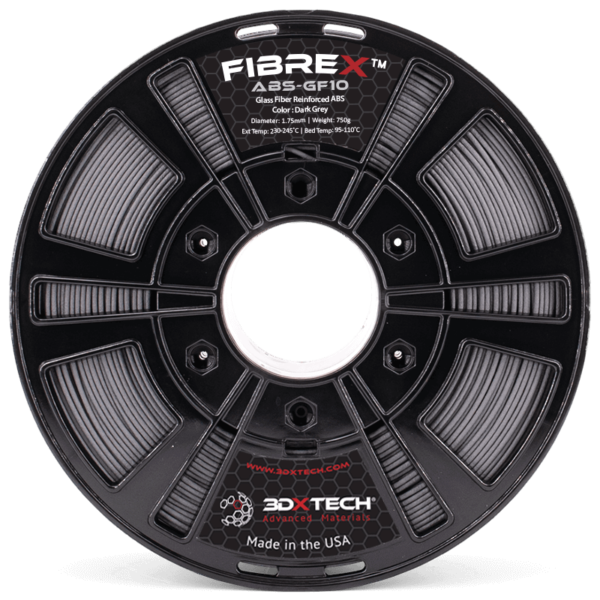3DXTECH
FIBERX ABS+GF 750g 2kg and 4kg
FIBERX ABS+GF 750g 2kg and 4kg
Couldn't load pickup availability
Share
FibreX™ ABS+GF (Glass‑Fiber Reinforced ABS)
Premium Engineering‑Grade Filament for High‑Strength, Low‑Warp Parts
FibreX™ ABS+GF is a glass‑fiber‑reinforced ABS designed for makers who need exceptional stiffness, dimensional stability, and reliable performance. This material delivers the strength of engineering plastics while avoiding the warping and lifting issues common with standard ABS.
Perfect for structural components, functional prototypes, jigs, fixtures, and any application where rigidity matters.
⭐ Key Features
-
Extremely stiff and strong — ideal for load‑bearing or structural parts
-
Minimal warping or shrinkage — prints flatter and more reliably than standard ABS
-
Excellent dimensional accuracy — great for tight‑tolerance components
-
High thermal resistance — functional up to 98°C depending on load
-
Smooth, consistent extrusion thanks to premium ABS and optimized glass‑fiber blend
-
Made in the USA using high‑end manufacturing processes
🧵 Material Overview
FibreX™ ABS+GF combines high‑quality ABS with a specialized glass fiber chosen specifically for compatibility with FDM/FFF printing. The result is a filament that prints like ABS but performs like a true engineering composite — rigid, stable, and dependable.
Filament Specifications:
1.75mm +/- 0.05mm in diameter
Glass Fiber Reinforced Filament

Glass Fiber Zoom In
What Is It?
Fibers made of glass reinforced into the polymer during manufacturing and aligned along the axis of filament.
This, along with their physical makeup, give this material enormous strength and mechanical properties.
TDS
🔧 Recommended Print Settings
| Setting | Recommendation |
|---|---|
| Extruder Temp | 230–245°C |
| Bed Temp | 95–110°C |
| Chamber | Heated chamber recommended (30–80°C) |
| Nozzle | 0.4mm minimum, hardened steel required |
| Layer Height | 0.25mm or higher |
| Drying | 80°C for 4 hours |
These settings help maximize layer adhesion, surface finish, and mechanical performance.
Abrasive Material
This material is particularly abrasive among 3D printing filaments. Users may find standard brass nozzles are chewed through very quickly compared to standard wear and tear. When worn through, the nozzle diameter will widen inconsistently and the printer will experience extrusion issues.
Use hardened steel nozzles with this filament to maximize toolhead life and quality of your prints!
Because of this, it’s strongly recommended this material be printed through a hardened steel nozzle rather than a softer metal. Hardened steel nozzles can often be inexpensive and easily installed depending on your printer manufacturer’s instructions.



